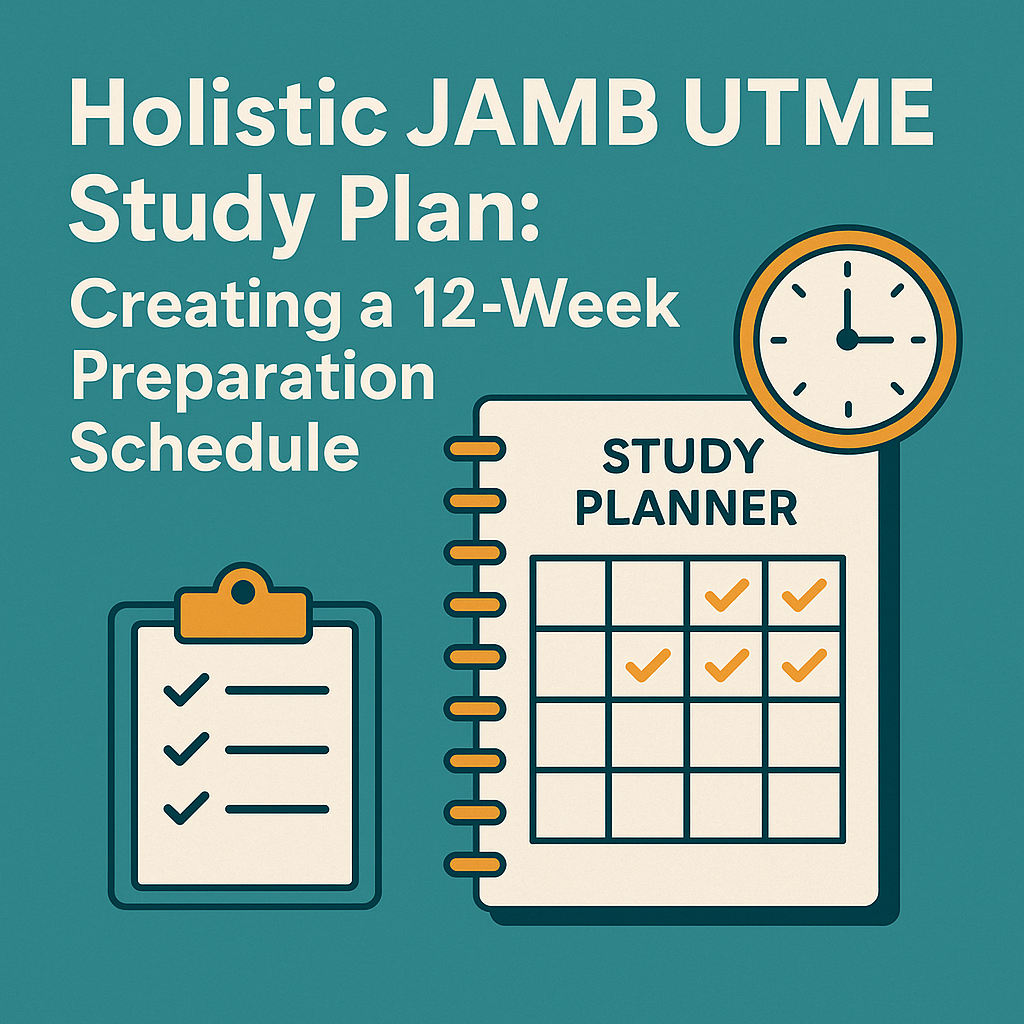1. Introduction
A systematic study schedule can be the difference between average performance and top-tier scores in the JAMB UTME. This article presents a detailed 12-week plan tailored to cover all core subjects—English, Mathematics, Biology, Chemistry, Physics, and Government—while allowing for targeted revision, mock exams, and well-being breaks.
By breaking down the syllabus into manageable weekly modules and integrating diverse study methods (active recall, spaced repetition, timed drills), you’ll build knowledge incrementally, reinforce weak areas, and develop the stamina for exam day.
This holistic approach ensures coverage of content and exam skills. Let’s explore how to structure your weeks for maximum retention and minimal burnout.
2. Planning Foundations
2.1 Setting SMART Goals
- Specific: “Master JAMB English comprehension techniques.”
- Measurable: “Score 80% in weekly comprehension quizzes.”
- Achievable: Align goals with current proficiency.
- Relevant: Focus on high-weight subjects and personal weaknesses.
- Time-Bound: Assign goals to specific weeks.
2.2 Gathering Resources
- Textbooks and past question compilations for each subject.
- Access to online platforms (JAMB CBT portal, Khan Academy).
- Stationery: timers, notebooks, flashcards.
2.3 Time Allocation Principles
- Daily Blocks: 3–4 hours on weekdays, 5–6 hours on weekends.
- Subject Rotation: Alternate between heavy and lighter subjects.
- Breaks: 5-minute break every 25 minutes (Pomodoro Technique).
3. Week-by-Week Breakdown
Weeks 1–4: Foundation Building
- Week 1: English basics & comprehension; Math fundamentals (number theory); Biology cell biology; Chemistry stoichiometry; Physics kinematics; Government political theories.
- Week 2: English vocabulary & cloze; Algebra; Genetics; Thermochemistry; Dynamics; Nigerian constitutional framework.
- Week 3: Grammar & essay structure; Trigonometry; Physiology; Inorganic periodic trends; Thermal physics; Elections and voting systems.
- Week 4: Past questions review (English & Math); Ecology; Organic functional groups; Electricity basics; Public policy cycles.
Weekly Tasks:
- Three 1-hour concept sessions per subject.
- Daily 30-minute flashcard review (vocab, formulas, definitions).
- Sunday mock quiz covering week’s topics.
Weeks 5–8: Skill Enhancement & Integration
- Week 5: Advanced comprehension & essay writing; Coordinate geometry; Evolution & ecology; Chemical kinetics; Circuit analysis; Case-study essays.
- Week 6: Mixed-topic timed drills (English & Math); Data interpretation (Bio & Chem); Waves & optics; International relations.
- Week 7: Targeted remedials for weakest subjects; Practice lab-based questions; Mock exam simulation.
- Week 8: Full-length subject-specific mocks; Feedback sessions; Adjust focus areas.
Weekly Tasks:
- Two 2-hour mock drills.
- Peer review group on Sundays.
- Reflective journaling on challenges and solutions.
Weeks 9–12: Final Polishing & Exam Simulation
- Week 9: Rapid-fire quizzes across all subjects; Timed essay marathons.
- Week 10: Full UTME practice under exam conditions; Simulate exam day routine.
- Week 11: Targeted revision: flashcards, summary sheets, formula sheets.
- Week 12: Light review; relaxation techniques; mental prep; brief quizzes; ensure rest and sleep hygiene.
Weekly Tasks:
- One full UTME past-paper every two days.
- Daily 15-minute mindfulness or stress-relief activity.
- Pre-exam checklist review: materials, logistics
4. Study Techniques & Tools
4.1 Active Recall & Spaced Repetition
- Use physical flashcards or apps (Anki) for high-yield facts.
- Schedule reviews at increasing intervals (1 day, 3 days, 1 week, 2 weeks).
4.2 Pomodoro & Timeboxing
- Work in 25-minute focused sessions with 5-minute breaks.
- Group related tasks to minimize context-switching.
4.3 Mock Exams & Performance Analysis
- After each mock, categorize errors: conceptual, careless, timing.
- Adjust weekly plan based on error patterns.
4.4 Collaborative Learning
- Study groups for peer teaching.
- Explain concepts aloud to reinforce understanding.
5. Well-Being & Exam Readiness
5.1 Physical Health
- Balanced diet, regular exercise.
- Consistent sleep schedule: 7–8 hours per night.
5.2 Mental Health
- Mindfulness exercises, breathing techniques.
- Limit social media during study periods.
5.3 Exam Day Logistics
- Pack necessary IDs, print slip, calculators.
- Plan travel; arrive 30 minutes early.
6. Conclusion
A structured 12‑week preparation schedule transforms overwhelming content into manageable milestones. By combining SMART goal setting, diverse study techniques, regular mocks, and well‑being practices, you’ll build competence and confidence for the JAMB UTME.
Start your journey today by mapping out Week 1 tasks and assembling your resources. Follow this roadmap diligently, adapt as needed, and embrace the process. Success in JAMB UTME is within your grasp plan strategically, study smartly, and succeed!
